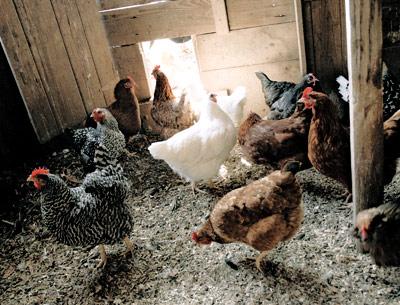Nature Notes With a Cluck, Cluck Here

As Roseanne Roseannadanna used to say, “What’s all this fuss about chickens?”
Having been born and raised next to my grandfather’s chicken farm in Mattituck, where he tended a flock of up to 5,000 chickens, I am quite partial to them. You might say the first bird species I learned was the once-wild fowl, Gallus gallus, or in this case, white leghorn, and the first bird I ever heard sing was the rooster.
On Monday I took my grandchildren from San Francisco to see the old homestead. It was still there almost in its original form, but the chicken farm next door was now occupied by myriad greenhouses, 20 or more. I had known something was up when I Googled it on Google Maps in April, and all I could see from the air were lots of rectangular glassy looking buildings laid out side by side.
Mattituck was as rural as the Midwest in the 1940s and 1950s — farm fields end on end, little fishing boats plying the waters of Long Island Sound and Peconic Bay. For a boy growing up it was the best it could be. I would gladly trade the sound of the motor vehicles that buzz by my house now at 1,000 per hour or the sound of the helicopters flying back and forth for the occasional crowings of a couple of roosters.
At night we might hear a plane go over or a couple of cars go by, but mostly we listened to the night music of tree crickets, katydids, whippoorwills, and barking dogs. One could almost imagine how nice the Native Americans had it 400 years earlier.
My family had chickens — barred rocks — Muscovi ducks, goats, and pigs, and very big vegetable and flower gardens. We canned, we pickled, we cured, we smoked, we shucked, we ate fresh. On weekends we clammed or fished. In other words, we were a typical rural eastern Long Island family. We lived to survive, not to entertain or make it into the pages of Better Homes and Gardens.
Well, here we are on the South Fork 60 years later and things have changed. Real estate is bigger than farming and fishing, horses have replaced cows, there are more automobiles and boats than you can shake a stick at, and very few vegetable gardens and few chickens. The wild turkeys and deer are the only things that keep us from becoming completely citified. When I worked for East Hampton Town I got lots of complaints about both.
One wonders what would happen if the economy keeps sinking and we find ourselves carrying on like a third world country, eking out a day-to-day find ourselves carrying on like a third world country, eking out a day-to-day existence and hanging on with our finger nails. A McMansion will not ensure survival as much as a little Bonac house. Those who have a garden, who have chickens, who know how to clam and fish, will get by. Those who don’t will be dependent upon those who do and will not be in a position to complain about roosters crowing.
I don’t have any chickens in my Noyac neighborhood, but if I did, I would welcome them with open ears. I get by with the crickets and katydids and the multi-pitched barking of neighbors’ dogs. When they go so will I.
Old McDonald had a farm, E I E I O, and on that farm he had some chickens — with a cluck, cluck here and a cluck, cluck there, here a cluck, there a cluck, everywhere a cluck, cluck. . . . See if you can finish it.
